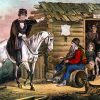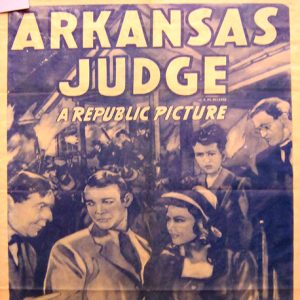calsfoundation@cals.org
Arkansas Judge
Arkansas Judge (1941) is the sixth in a series of eleven comedies made by Republic Pictures from 1938 to 1943 featuring the Weaver Brothers and Elviry (consisting of Missourians Leon, Frank, and June Weaver), a popular “rube” vaudeville and radio act. The Weaver series also included Down in “Arkansaw” (1938), the first film in the series. In his book Hillbilly, Anthony Harkins noted that the years 1937–1945 saw “the hillbilly stereotype at high tide” in popular culture, with the Weavers and Judy Canova making pictures at Republic, Arkansan Bob Burns appearing in films for Paramount (including The Arkansas Traveler, 1938), and the Lum & Abner show on the radio. Arkansas Judge was the only movie in the series set in Arkansas after the first film.
Arkansas Judge, directed by Frank McDonald, was based on Irving Stone’s novel False Witness (1940), though Republic changed the setting of the story from California to Arkansas, presumably to accommodate the Weavers. (False Witness was the title of the film’s British release.)
In Arkansas Judge, the harmonious town of Peaceful Valley (with a prominently labeled “trouble bell” in the community hall) is torn apart when Hettie Huston, spoiled daughter of the town banker, steals money from an old widow. Her father, August Huston, permits suspicion to fall on innocent cleaning woman Mary. When Judge Abner Weaver (Leon Weaver) honorably resists town gossip and refuses to indict either Hettie or Mary, Huston sues the judge for slander, since he knows that Hettie will be the subject of suspicion unless Mary is indicted. Accused of “implying” Hettie’s guilt, the upright judge says, “I don’t hold with implyin’.” When he wins an enormous judgment against Judge Weaver, Huston offers to tear up the verdict if the judge indicts Mary. Weaver still refuses. An angry mob burns Mary’s home, believing she has fled, but she is hiding in the house. Young lawyer Tom Martel (Roy Rogers) rescues Mary. Hettie breaks down and confesses her guilt.
This saga of small-town decency endangered by gossip, hysteria, and the selfish rich has one well-known star, Roy Rogers, though he plays a lawyer rather than his usual cowboy role. There are a few songs in the movie, including “Home in Arkansas,” and Rogers sings one song, “In Peaceful Valley.” His movie horse, Trigger, is in the film but has little to do except for one brief chase scene. The film is merely adequate, but it improves near the end with the dramatic (and funny) courtroom scene, the mob scene, and the fire rescue.
Rogers does well as the defense lawyer in the trial scene, but the best performances are by Frank M. Thomas as Huston, who is anguished at having to accuse an innocent woman but chooses the dishonest path anyway to save his daughter, and Leon Weaver as the judge, who insists on absolute integrity no matter what the consequences for himself and his family. The attack on Mary’s house by the torch-waving mob is suggestive of nightriders and Klansmen, while the scene in which Judge Weaver loads his family in his truck after losing everything in the slander suit recalls the Arkies and Okies who went west to escape the Dust Bowl and the Depression.
The Variety review on July 23, 1941, reported that the Weavers’ series “takes a fling at more serious drama in Arkansas Judge. Shift from absurd comedy is an improvement” in an “outright meller [melodrama] yarn….Both scripting and direction are evenly paced.” Robert Cochran and Suzanne McCray in Lights! Camera! Arkansas! (2015) note that both of the Weavers’ Arkansas-set films “mix positive traits of generosity, hospitality, and native intelligence with the standard hillbilly stereotypes.”
For additional information:
“Arkansas Judge.” Internet Movie Database. http://www.imdb.com/title/tt0033353/?ref_=fn_tt_tt_1 (accessed December 3, 2025).
Cochran, Robert, and Suzanne McCray. Lights! Camera! Arkansas!: From Broncho Billy to Billy Bob Thornton. Fayetteville: University of Arkansas Press, 2015.
Harkins, Anthony. Hillbilly: A Cultural History of an American Icon. New York: Oxford University Press, 2004.
Hurst, Richard M. Republic Studios: Between Poverty Row and the Majors. Lanham, MD: Scarecrow Press, 2007.
Martin, Len D. The Republic Pictures Checklist. Jefferson, NC: McFarland, 2006.
Michael Klossner
Little Rock, Arkansas







Comments
No comments on this entry yet.